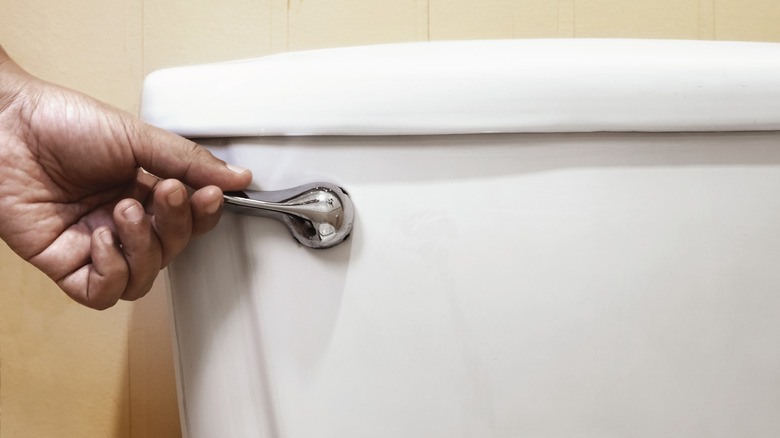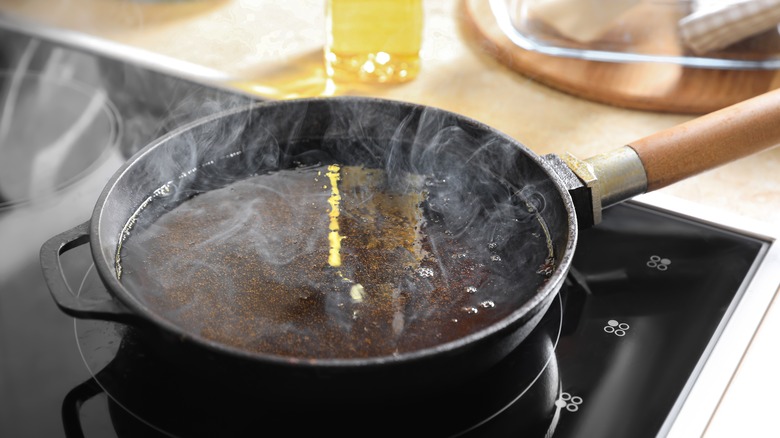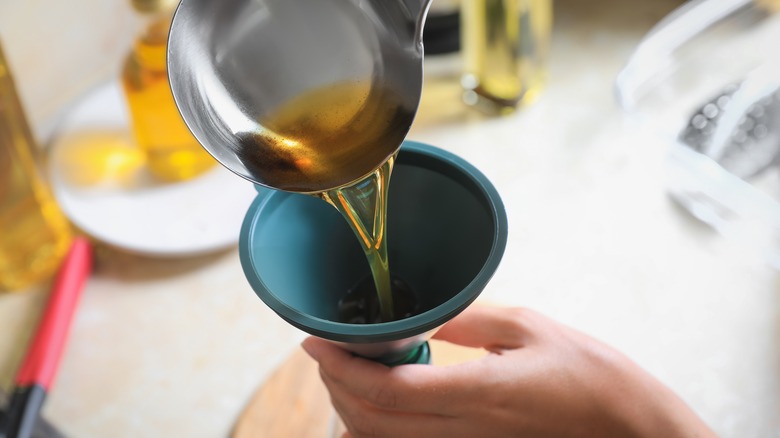What Happens If You Dispose Of Cooking Grease In The Toilet?
The process of cooking food results in a ton of waste. Some of this waste is disposed of correctly while other items, such as cooking grease, are not. So many of us are guilty of frying up a batch of food and then resorting to unorthodox means to throw away the leftover grease. A lot of people go as far as tossing an entire pot of this liquid down the toilet and flushing it into the sewer. While this may seem like a better idea than pouring it down your kitchen sink drain, it's not. It's actually a huge blunder you want to avoid.
In the eyes of many, grease is a liquid just like water, which means pouring it down the toilet shouldn't have any negative pushbacks. However, while it may be a liquid sometimes, it doesn't last in that state for long. When we cook, the grease is very loose, but when it is poured into your toilet, it cools down and solidifies. Once that happens, it can block the pipe connecting your water closet to the sewer. Some people mix the grease with plenty of soap to emulsify it and then wash it down with water. Don't do this either, as it can be even worse. Not only will the grease molecules solidify, the soap can stick to other particles in the pipes. This could form a blockage that would give your pockets something to worry about.
What happens when the cooking grease gets to the sewer
Lots of solids are already flushed down your toilet, including toilet paper. Mixing these with grease isn't a good idea, unless you have a thing for clogged pipes and overflowing toilets. If you flush your cooking grease down the toilet and it eventually reaches the sewer without blocking up your pipes, do not pat yourself on the back. This can spell disaster for your entire community. As everyone keeps spilling their grease into their toilets and flushing it out into the sewage system, it breaks down into fatty acids and glycerol which in turn combines with calcium minerals in the water to form "fatbergs." These large clumps of fat end up blocking the main pipes down there, causing a major dilemma for your town.
According to National Geographic, these fatbergs cost a pretty penny to remove, and it can take ages. Giant sewer blockages cost New York City $18 million to remove over a five-year span. Fort Wayne, Indiana also spent $500,000 annually getting rid of the built-up fat in their sewage system. This domino effect begins with you flushing your grease, so it's time to get educated on better and healthier disposal practices.
Dispose of cooking grease properly
After cooking, you have to resist the temptation to simply flush grease down the toilet and find a better method. You can save the grease for reuse a few times until it's ready for its final resting place. There are numerous ways you can handle disposing of grease without endangering your pipes as well as the health of your community, but the best route of disposal is the garbage. Pour the grease into a container like a jar and then dispose of it. You can also let it cool down and solidify before spooning it into a container and then throwing it away.
If your food didn't produce enough that would need to be poured out, you can just spread some paper towels onto the pot or pan and let them soak up the grease, then throw the towels away when you're done. If you've already started flushing cooking grease down the toilet, you can also flush down some hot water to cleanse your pipes. However, this isn't a long-term solution and will only serve to carry the grease right into the sewage system, so you definitely want to curb this habit.


